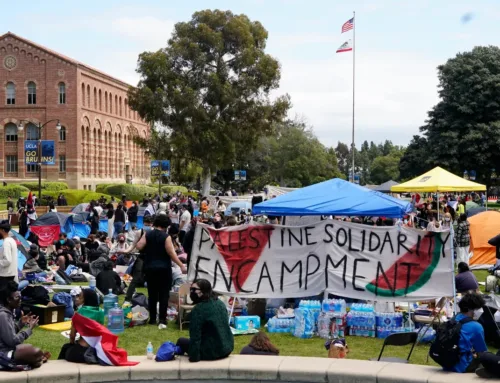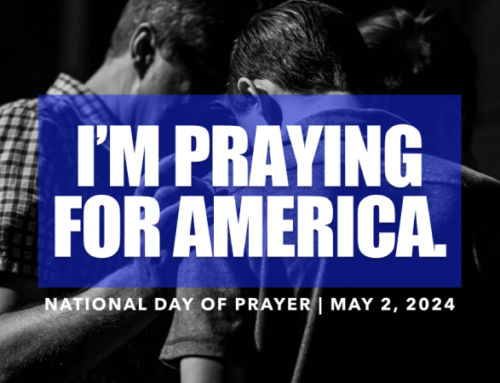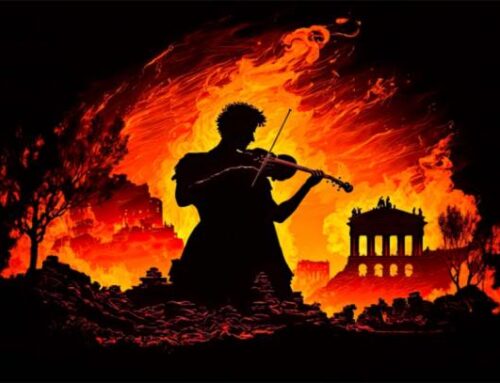One very plain and clear thing I have learned over time, always the hard way, is that God does not walk away from us. We walk away from Him. We turn from Him. We stray. We become otherwise occupied. We are filled with doubts, despair, fears and allow the voice of Satan to override the voice of God, the Word of God to teach us daily He will not forsake or abandon us.
Do not despair. Do not fear. Do not doubt. No matter the adversary, the circumstances, the times. Look to the Word. Look to the history of the unchangeable loving God in the Word as to how He did not leave individuals or entire peoples — they left Him and it only appeared it was God that did the abandoning.
It would be like being very ill. Needing lifesaving surgery. And the skilled surgeon is ready, willing, able, and in the operating room — but as the one in need to be healed you walk away from the operating room, walk away from the hospital. Then blame the doctor as you grow worse in your health.
God is right at hand. Just reach out. Just ask. At any time. Anywhere. In any situation. Always.
Without doubting. Not ashamed. Not hesitant.
His presence truly is near. Aways.
I have provided the full text of Psalms 74 & 75 below the article by Dr. Matt Ayars found below.
And in those times when I grow foolish? And wonder where God went? I daily remind myself His Spirit lives within me. He is closer to me than any modern-day device. All I have to do is call out to Him. From my heart. And come to realize continually that it is I who tend to stray and walk away. Never God our Father. I tend to be the straying sheep needing the rod and the staff of the Shepherd to bring me back to His loving protective arms…
Ken Pullen
Saturday, December 12th, 2020
ACP — A Crooked Path
Don’t Despair, His Presence Is Near
Friday, December 11, 2020
By Dr. Matt Ayars
Reprinted from American Family Association
Psalms 74 and 75 speak to one another.
In Psalm 74 we hear a desperate cry for help. The unthinkable happened when the Babylonians destroyed the Jerusalem temple. The psalmist in Psalm 74 says,
Your foes have roared in the midst of your meeting place; they set up their own signs for signs. They were like those who swing axes in a forest of trees. And all its carved wood they broke down with hatchets and hammers. They set your sanctuary on fire; they profaned the dwelling place of your name, bringing it down to the ground. They said to themselves, “We will utterly subdue them”; they burned all the meeting places of God in the land (4–8).
The temple was—on the one hand—the center of religious life and identity for God’s people. The temple was the normative place of God’s presence for Israel. If you wanted to be in God’s presence, all you had to do was go to the temple. No matter how bad things seemed in Israel, there was the comforting knowledge that the temple stood not far away. At any moment of crisis or even of celebration, Israelites could face the temple and be assured of the presence of God. He was always there in their midst, blessing them with his presence.
The temple was also a memorial of God’s saving work in the lives of Israel and their ancestors. The temple came about after the deliverance from Egyptian slavery. After 400 years in slavery, God showed up and brought them to the Promised Land. The temple was a reminder that God was far superior to any human king, pharaoh, or deity of foreign nations. No matter what came their way, they could remember that God split the Red Sea. This inspired hope.
There’s even more to it than this. The temple also reminded Israel of the covenant that made them all that they were. The temple, whose first iteration was the tabernacle in the desert, was the climax of the covenant agreement that their ancestors made with God, through Moses, at Sinai. The temple reminded them that above all, they were God’s.
In other words, the temple wasn’t only the center of religious life and identity of God’s people, the temple was the source of everything about who they were. It anchored them in the past and prepared them for the future. Without the temple, they were no one.
Imagine how distraught the Israelites must have been when the Babylonians destroyed the temple. The words of Psalm 74 describe pagans burning the temple to the ground. The first verse of the psalm, in a way, sums up the sentiment of the community, “O God, why do you cast us off forever? Why does your anger smoke against the sheep of your pasture?”
In this moment, everything seems lost.
Then we turn to Psalm 75, whose opening verse says, “We give thanks to you, O God; we give thanks, for your name is near. We recount your wondrous deeds.” This is a way of talking about God’s presence.* Psalm 75 is saying that even though the temple is gone, his presence is still with them.
While there are a number of observations to make about this, the one I want to point out is that this is the very next Psalm. These Psalms are immediate neighbors. You don’t have to read long to go from being on the brink of despair to God’s very presence.
As God’s people, we should not despair, for he can act in a moment.
There are times when we have to wait a long time for God to speak into our circumstances. There are other times, however, when he speaks in an instant. The point is, never despair.
Even when things seem most dire, dark, lost, and without hope, God can change things in an instant.
2 Corinthians 4:8-9 says,
We are hard pressed on every side, but not crushed; perplexed, but not in despair; persecuted, but not abandoned; struck down, but not destroyed.
No matter how hard things may seem in your internal, private life, God is near and can act in a moment. No matter how chaotic the affairs of the world around us, God need only speak a single word and everything can change.
*Back in the Exodus story, the ancient writers describe God’s presence in the tabernacle by saying that he placed his name there. See Deuteronomy 12:5, 11, and 21.
(Note: This was posted first on Dr. Ayars site HERE)
Psalm 74 — English Standard Version
Arise, O God, Defend Your Cause
A Maskila of Asaph.
1O God, why do you cast us off forever?
Why does your anger smoke against the sheep of your pasture?
2Remember your congregation, which you have purchased of old,
which you have redeemed to be the tribe of your heritage!
Remember Mount Zion, where you have dwelt.
3Direct your steps to the perpetual ruins;
the enemy has destroyed everything in the sanctuary!
4Your foes have roared in the midst of your meeting place;
they set up their own signs for signs.
5They were like those who swing axes
in a forest of trees.b
6And all its carved wood
they broke down with hatchets and hammers.
7They set your sanctuary on fire;
they profaned the dwelling place of your name,
bringing it down to the ground.
8They said to themselves, “We will utterly subdue them”;
they burned all the meeting places of God in the land.
9We do not see our signs;
there is no longer any prophet,
and there is none among us who knows how long.
10How long, O God, is the foe to scoff?
Is the enemy to revile your name forever?
11Why do you hold back your hand, your right hand?
Take it from the fold of your garmentc and destroy them!
12Yet God my King is from of old,
working salvation in the midst of the earth.
13You divided the sea by your might;
you broke the heads of the sea monstersd on the waters.
14You crushed the heads of Leviathan;
you gave him as food for the creatures of the wilderness.
15You split open springs and brooks;
you dried up ever-flowing streams.
16Yours is the day, yours also the night;
you have established the heavenly lights and the sun.
17You have fixed all the boundaries of the earth;
you have made summer and winter.
18Remember this, O LORD, how the enemy scoffs,
and a foolish people reviles your name.
19Do not deliver the soul of your dove to the wild beasts;
do not forget the life of your poor forever.
20Have regard for the covenant,
for the dark places of the land are full of the habitations of violence.
21Let not the downtrodden turn back in shame;
let the poor and needy praise your name.
22Arise, O God, defend your cause;
remember how the foolish scoff at you all the day!
23Do not forget the clamor of your foes,
the uproar of those who rise against you, which goes up continually!
Footnotes:
a 1 Probably a musical or liturgical term
b 5 The meaning of the Hebrew is uncertain
c 11 Hebrew from your bosom
d 13 Or the great sea creatures
Psalm 75 — English Standard Version
God Will Judge with Equity
To the choirmaster: according to Do Not Destroy. A Psalm of Asaph. A Song.
1We give thanks to you, O God;
we give thanks, for your name is near.
Wea recount your wondrous deeds.
2“At the set time that I appoint
I will judge with equity.
3When the earth totters, and all its inhabitants,
it is I who keep steady its pillars. Selah
4I say to the boastful, ‘Do not boast,’
and to the wicked, ‘Do not lift up your horn;
5do not lift up your horn on high,
or speak with haughty neck.’”
6For not from the east or from the west
and not from the wilderness comes lifting up,
7but it is God who executes judgment,
putting down one and lifting up another.
8For in the hand of the LORD there is a cup
with foaming wine, well mixed,
and he pours out from it,
and all the wicked of the earth
shall drain it down to the dregs.
9But I will declare it forever;
I will sing praises to the God of Jacob.
10All the horns of the wicked I will cut off,
but the horns of the righteous shall be lifted up.
Footnotes:
a 1 Hebrew They







Leave a Reply, please --- thank you.